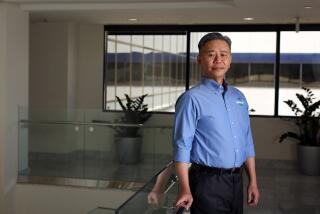Despite 73% Earnings Drop : Wang’s Founder Sets Sights on 15% Growth
- Share via
An Wang set himself a rigorous schedule last July when he reassumed the presidency of his company. He pledged that, within the year, he’d visit each and every one of Wang Laboratories’ 38 U.S. district offices. And, he said, the company’s sales would grow 15% in the same period.
The Doctor, as folks in and out of the company call him, was never much of a traveler. But now, halfway through the fiscal year and just days short of his 66th birthday, Wang appears to be happily keeping pace.
His company, however, is falling behind.
While the company’s revenue through the first six months was up about 6.5% from last year, earnings fell 73% from the year-ago period.
Wang still thinks the goal of 15% growth is “do-able” for the company he founded in 1951, indicating the second half of the year will be better than the first. In fact, he said while in Los Angeles last week, the goal should be easy.
Growth at Wang Labs, a pioneer of office automation and word processing machines, was almost mathematically boring--a consistent 40% to 50% a year for more than three decades. Wang said he’d much rather have that steady growth than the explosive growth some computer companies experienced in the first half of this decade.
“Our growth has been better,” Wang said. “Companies that mushroom like that, they don’t have time to learn as much as I did. . . . It was big growth, but we grew consistently and it gave my managers time to learn.”
Fiscal 1985, however, was dramatic and unsteadying. Wang Labs’ revenue grew less than 9% and profits dropped off by 93%. Wang Labs was suffering from the direct assault on its markets by personal computers; it began what it called a “muscle building” program that entailed shedding more than 1,500 employees and undergoing other cost-reduction regimens. It also tried to improve its products and their role in the new office technologies.
Apparent differences over how to restimulate the company’s growth led to the resignation last July of John Cunningham, who had become president of Wang Labs in 1983. An Wang, who before Cunningham had been president for 30 years and still served as chairman and chief executive of the Lowell, Mass.-based company, once again took over the presidency.
Nothing much changed when he got the job back, Wang said, except that he began to do all the traveling previously done by Cunningham.
Wang is candid about the company’s problems last year and said that “they were pretty much our own fault. We planned too aggressively and without listening to our customers’ needs.”
The cross-country treks to meet with customers and employees were planned to give customers a forum and Wang Labs more visibility. A two-day stop in Los Angeles included a reception for more than 350 of the company’s local employees and visits to customers wedged in between crowded luncheons and even bigger breakfast meetings.
The discussions, Wang said, center on the future of technology and office automation. “We like to listen,” said Wang. “Rather (than me) telling them, I like to listen.”
Lengthy Delays Hurt
Analysts have said it will take more than listening to put some of the mathematical stability back into Wang Labs. Lengthy delays in bringing out promised products further handicapped it in the increasingly competitive field of office automation, a market that IBM, Digital Equipment, Data General and other major manufacturers are counting on for healthy sales growth in coming years.
Many in the industry say that Wang Labs stumbled in the face of IBM’s entry into a market that Wang had long dominated, and it still hasn’t capitalized on its reputation as the secretary’s friend and a solid financial base (1985 revenue was $2.3 billion).
Also, the depth of the company’s management team worried industry analysts in the past. Those concerns were deepened by Cunningham’s departure, which some traced to increasing speculation that Cunningham would be aced out of the succession by Frederick A. Wang, the founder’s 36-year-old son.
Family Controls 40%
The elder Wang refuses to say that he’s grooming his son for the top job. However, he said that the family’s control of almost 40% of the company’s stock gives it the power to elect a majority of the company’s directors and that “Fred, whether he’s chief executive officer or not, would be the de facto family leader if I weren’t around.”
In the meantime, he said, he’ll continue running the company as long as it’s enjoyable and he has the strength to do so.
In the past, he noted, he had a whole year to learn how to manage a company that grew 40%. “Now that’s only 15%, and it should be easier,” he said.






